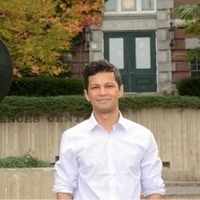Physics & Astronomy - Thesis Defense - Dhrubo Jyoti, Dartmouth College
Title: "Topics in Theoretical Cosmology"
Abstract: Two of the current exciting areas of research in cosmology are, the inflationary paradigm, and late-time acceleration. Cosmology being the study of Nature at the largest, grandest scales, both of these areas have fascinating interplay of diverse ingredients -- among others, matter, gravity, and quantum mechanics.
The inflationary paradigm produced our Euclidean and homogeneous Universe, but what ``substance" could have powered the explosive, nearly-exponential expansion of the universe is still an open question. We construct a model of inflation powered by interaction between a massive gauge field and fermions quantized on an expanding background. We present the model's novel features as well as issues.
Secondly, at the core of quantum mechanics is a profound idea, that the total energy content of space is fundamentally imprecise. A crucial implication is, crudely: space is never truly empty! Inflation, most intriguingly, seeded all structure in the Universe -- galaxies, stars and so on -- from these quantum mechanical scintillations in ``empty" space! Despite its mathematical beauty and observational support, there are controversies with this picture, namely a cosmological quantum measurement problem. We define and discuss this problem, and a toy-model resolution.
Finally, cosmic late-time acceleration revealed by supernovae could be a symptom of gravity deviating from Einstein's theory at cosmological scales. We present a phenomenological model of gravitational screening, covering a wide range of modified theories of gravity. We promote the classic solar system post-Newtonian curvature parameter gamma to a step function in space, dividing a galactic or cluster dark matter halo into an inner GR region, and an outer non-GR region extending to extra-galactic space. We develop formalism to confront the model with observations, using time-delay data from strongly-lensed quasars. We pave the way for upcoming observations and more sophisticated analyses.
